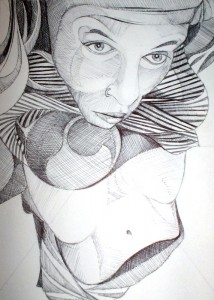
The following art therapy technique is by our newest guest author Dr. Deah Schwartz. Please welcome Dr. Schwartz to the Art Therapy Team! If you like this activity, stay tuned for more art therapy techniques from Dr. Schwartz in the future as she explores ways to help people with body image and eating disorder issues.
Art Therapy Technique: Tracings of Love
Materials:
Magazines, butcher paper, construction paper, pencils, markers, scissors, glue sticks.
How To:
This is an adaptation of the body tracing exercise that many art therapists use with their clients. If you are working with a group where it is inappropriate to have their bodies traced or aren’t amenable to the process, you can provide them with an outline of a body on a large piece of paper to work with.
- Have participants trace each others’ bodies on the butcher paper or provide each client with a piece of paper with a generic outline of a body.
- On the other side of the paper, have the clients write down the negative external messages they receive about their bodies then flip the paper over.
- Using collage materials, colors, texts, and drawings, have the clients assign attributes to their body parts that focus on what those body parts do best and how they are and have been valuable.
- Encourage the clients to use functional adjectives like strength, motion, and specific examples. Remind them NOT to focus on the judgments they or others may have about what constitutes beauty or perfection, those thoughts and words should be written on the other side of the paper.
- When the artwork is complete have each person choose one part of their body that they struggle with the most in re: to self-acceptance and share first the negatives and then the positives on the art piece. Note the commonalities and differences among the group.
Why:
Whenever collage is used with clients addressing body image and eating disorders issues it provides rich opportunities to discuss the power that printed/visual media has over self-esteem and body acceptance. In addition, this therapeutic directive helps the client remember and or discover that her body has more value in the world than just looking a certain way. Nurturing a true self-love for a body’s abilities rather than perceived liabilities is a vital step towards living a physically and emotionally healthy lifestyle.
im a student psychology in iran ,and i love art therapy,this thechniqe is very intresting for me
i think this will be one of the best technique to help my clients realize the negative habits they unconsciously do that mnake them overweight, i wlll use this in my next session with them thanks…
Interesting how the Universe works. We executed this art directive last week in my women’s group and this week we’ll process through them. The women I work with are recovering from chemical dependency. Many have huge, yet quiet sufferings tied to body image. Imagine taking methamphetamine for many months, stopping use, the body is inadequately cared for (lack of money for healthy supplements, lack of exercise, huge cravings for unhealthy types of foods to fill the void of the drug). I am so excited to help my clients get in touch with the difficulties they face, contrasted with what they do like about their bodies. I love the ideas expressed here because I’m realizing it’s going to take more than 2 sessions to address. Thanks so much for this article. I want to hear more! Warm Creative Expressions to you! Karen
I appreciate that the author stated that it may not be appropriate for some to have their body traced. Having one’s body traced may seem like an innocuous task, but for clients with histories of trauma, boundary violations, severe anxiety, or psychotic symptoms, the process of being traced can have a destabilizing influence.
Hi I am happy to read such wonderful feedback on this directive. Adam, it is always important, as you clearly point out, to know when an Art Therapy directive needs to be adjusted for different populations and diagnoses.
Warmly, Dr. Deah
hello Dr Deah Schwartz
thrilled to find your article as i am reading for Master 2 in Clinical psychology (Paris VIII )i am currently completing a “mémoire” on clinical methodology for female juvenile delinquents in detention ; during my practical in prison i’ve set up a workshop for 6 girls over a period of 6 weeks with 3 types of activities individual / in pairs for body profile / as a group;so far my theoretical research on art therapy has been mainly in french bibliography but as submission date is nearing i am lacking in recent references in English Would you care to share your experience in this field or give me links to articles less than 5 years old concerning art therapy in the female juvenile carceral context thanks a million jackie forget